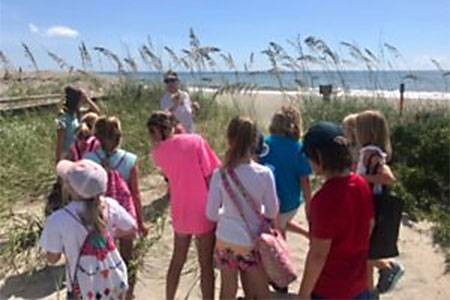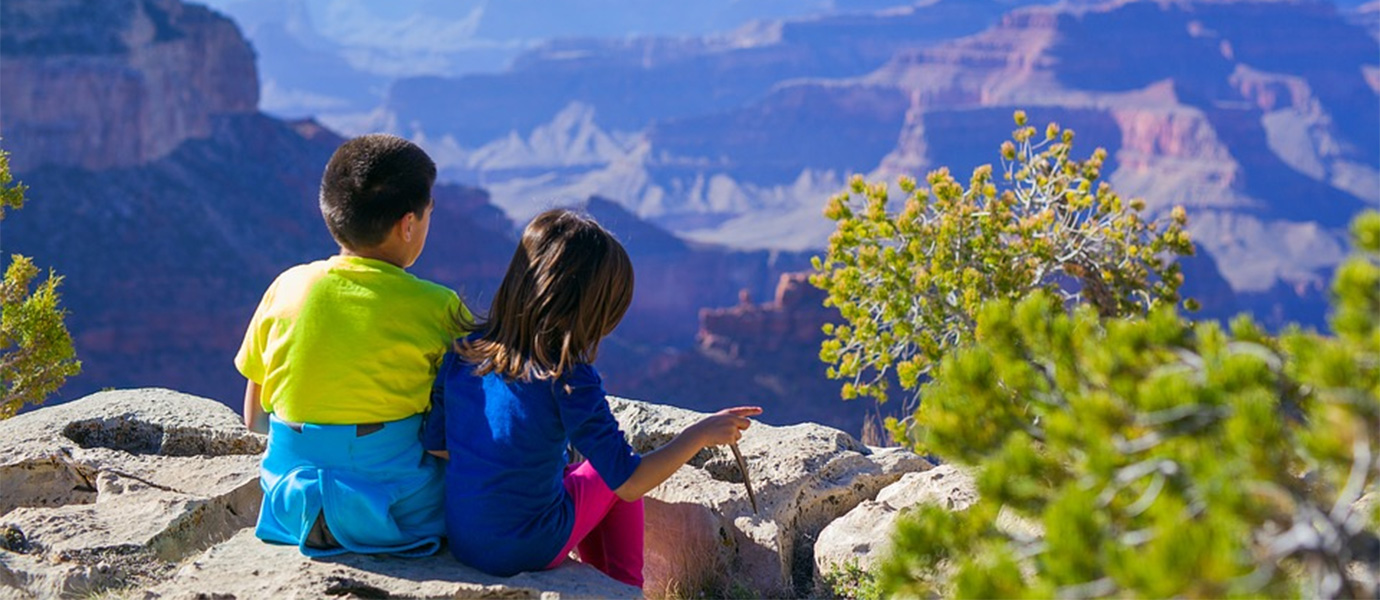
School
In the Discovery Center, groups can see exhibits documenting the area’s unique history and ecology with photos, artifacts, and live animals. Topics such as 19th-century settlements, fishing, slavery, and indigenous animals are covered. Groups can schedule a marsh or forest ecology program that incorporates outdoor activities into their lesson. Younger groups can learn the characteristics of different plants and animals, while older groups might collect habitat data or brainstorm solutions to problems such as land management, species extinction, and fire ecology.
supports classroom learning in:
Environmental Studies, Social Studies.
topics covered:
Ecology, Animals, Natural History, Colonial History, Slavery.
contact info
Name: Richard Camlin.
Phone: 843-546-4623
Email: [email protected]
INFO
ABOUT
Hobcaw Barony
Started as a royal land grant in 1718, this 16,000-acre refuge is now used for teaching and research. Hobcaw Barony encompasses a rich diversity of every common ecosystem found on the South Carolina coast, making it an unparalleled site for research in the environmental sciences. Over 70 cultural sites on the plantation including cemeteries, slave cabins, and the Baruch’s homes all provide a time capsule for educators.
contact info
Hrs: Vary.
HELPFUL LESSON PLAN(S)
Prepared by FieldTripDirectory.com
Nature Exploration Lesson Plan
FUN FACTS
One single tree can provide the oxygen required for two human beings and over 8,000 sheets of paper. Trees can also clean the soil and air by absorbing harmful pollutants. So what have you done for a tree lately? Nature centers and state parks provide a hands-on environment to discover facts about native plants and animals, as well as ways to preserve these natural resources.
View Lesson Plan>>
Scouts
In the Discovery Center, groups can see exhibits documenting the area’s unique history and ecology with photos, artifacts, and live animals. Topics such as 19th-century settlements, fishing, slavery, and indigenous animals are covered. Groups can schedule a marsh or forest ecology program that incorporates outdoor activities into their lesson. Younger groups can learn the characteristics of different plants and animals, while older groups might collect habitat data or brainstorm solutions to problems such as land management, species extinction, and fire ecology.
supports scout badges in:
Environmental Science, Social Studies.
topics covered:
Ecology, Animals, Natural History, Colonial History, Slavery.
contact info
Name: Richard Camlin.
Phone: 843-546-4623
Email: [email protected]
INFO
ABOUT
Hobcaw Barony
Started as a royal land grant in 1718, this 16,000-acre refuge is now used for teaching and research. Hobcaw Barony encompasses a rich diversity of every common ecosystem found on the South Carolina coast, making it an unparalleled site for research in the environmental sciences. Over 70 cultural sites on the plantation including cemeteries, slave cabins, and the Baruch’s homes all provide a time capsule for educators.
contact info
Hrs: Vary.
HELPFUL LESSON PLAN(S)
Prepared by FieldTripDirectory.com
Nature Exploration Lesson Plan
FUN FACTS
One single tree can provide the oxygen required for two human beings and over 8,000 sheets of paper. Trees can also clean the soil and air by absorbing harmful pollutants. So what have you done for a tree lately? Nature centers and state parks provide a hands-on environment to discover facts about native plants and animals, as well as ways to preserve these natural resources.
View Lesson Plan>>
Camp
In the Discovery Center, groups can see exhibits documenting the area’s unique history and ecology with photos, artifacts, and live animals. Topics such as 19th-century settlements, fishing, slavery, and indigenous animals are covered. Groups can schedule a marsh or forest ecology program that incorporates outdoor activities into their lesson. Younger groups can learn the characteristics of different plants and animals, while older groups might collect habitat data or brainstorm solutions to problems such as land management, species extinction, and fire ecology.
topics covered:
Ecology, Animals, Natural History, Colonial History, Slavery.
contact info
Name: Richard Camlin.
Phone: 843-546-4623
Email: [email protected]
INFO
ABOUT
Hobcaw Barony
Started as a royal land grant in 1718, this 16,000-acre refuge is now used for teaching and research. Hobcaw Barony encompasses a rich diversity of every common ecosystem found on the South Carolina coast, making it an unparalleled site for research in the environmental sciences. Over 70 cultural sites on the plantation including cemeteries, slave cabins, and the Baruch’s homes all provide a time capsule for educators.
contact info
Hrs: Vary.
HELPFUL LESSON PLAN(S)
Prepared by FieldTripDirectory.com
Nature Exploration Lesson Plan
FUN FACTS
One single tree can provide the oxygen required for two human beings and over 8,000 sheets of paper. Trees can also clean the soil and air by absorbing harmful pollutants. So what have you done for a tree lately? Nature centers and state parks provide a hands-on environment to discover facts about native plants and animals, as well as ways to preserve these natural resources.
View Lesson Plan>>
Homeschool
In the Discovery Center, groups can see exhibits documenting the area’s unique history and ecology with photos, artifacts, and live animals. Topics such as 19th-century settlements, fishing, slavery, and indigenous animals are covered. Groups can schedule a marsh or forest ecology program that incorporates outdoor activities into their lesson. Younger groups can learn the characteristics of different plants and animals, while older groups might collect habitat data or brainstorm solutions to problems such as land management, species extinction, and fire ecology.
supports classroom learning in:
Environmental Studies, Social Studies.
topics covered:
Ecology, Animals, Natural History, Colonial History, Slavery.
contact info
Name: Richard Camlin.
Phone: 843-546-4623
Email: [email protected]
INFO
ABOUT
Hobcaw Barony
Started as a royal land grant in 1718, this 16,000-acre refuge is now used for teaching and research. Hobcaw Barony encompasses a rich diversity of every common ecosystem found on the South Carolina coast, making it an unparalleled site for research in the environmental sciences. Over 70 cultural sites on the plantation including cemeteries, slave cabins, and the Baruch’s homes all provide a time capsule for educators.
contact info
Hrs: Vary.
HELPFUL LESSON PLAN(S)
Prepared by FieldTripDirectory.com
Nature Exploration Lesson Plan
FUN FACTS
One single tree can provide the oxygen required for two human beings and over 8,000 sheets of paper. Trees can also clean the soil and air by absorbing harmful pollutants. So what have you done for a tree lately? Nature centers and state parks provide a hands-on environment to discover facts about native plants and animals, as well as ways to preserve these natural resources.
View Lesson Plan>>
